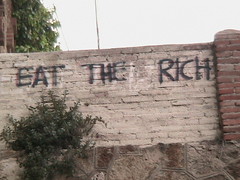Calls for Stricter Tax Haven Legislation Answered
by Gary Therkildsen*, 10/28/2009

Yesterday, the chairmen of the Senate Finance and House Ways and Means committees introduced legislation to crack down on overseas tax havens. Coming on the heels of the Internal Revenue Service's (IRS) successful amnesty program that rooted out tax cheats hiding assets overseas, the Foreign Account Tax Compliance Act would help the government root out more cheaters by providing tools to target foreign banks and other entities that provide hiding places for wealthy Americans' riches.
The legislation, introduced as companion bills, seeks to force foreign financial institutions, including trusts and corporations, to provide information about their U.S. account holders. According to a Congressional Quarterly (subscription required) report yesterday:
The bill would require an array of new reporting by foreign financial institutions in an attempt to give the IRS more data to detect fraud and tax evasion. It is an amalgam of ideas floated over the past year by top lawmakers on the Senate Finance and House Ways and Means committees, as well as President Obama.
If foreign banks refused to comply with the new regulations, the government would levy a 30 percent withholding tax on income from U.S. financial assets held by that foreign institution. The Congressional Budget Office (CBO) expects the legislation to bring in an additional $8.5 billion over a 10-year period.
Despite receiving wide praise from the White House and Capitol Hill, the legislation is missing the endorsement of two of the most respected legislators that deal with tax issues. Neither Sen. Carl Levin (D-MI), who recently called for comprehensive tax haven legislation, nor Rep. Lloyd Doggett (D-TX), are signed on to the bill. In a statement, Rep. Doggett claimed that the new legislation did not go far enough because it did not address multinational corporate tax evasion, something that Levin and Doggett confronted in legislation they introduced earlier this year.
Image by Flickr user docufotografiti used under a Creative Commons license.



